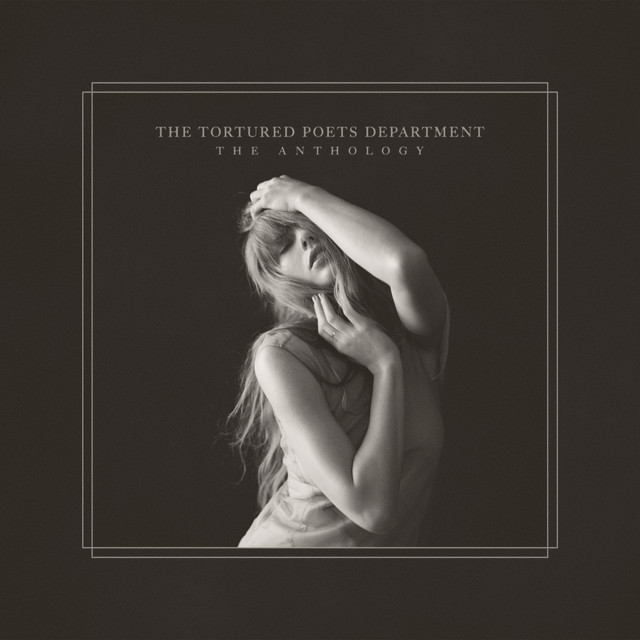“All’s fair in love and poetry,” reads the tagline for Taylor Swift’s latest album “The Tortured Poets Department,” released on Friday, April 19. Penned over the last two years, the record is an introspective look into the pop superstar’s private life amidst a series of highly publicized breakups and romances. While not Swift’s first album to chronicle a rocky period in her romantic endeavors, it’s the first to be labeled as a collection of diary-like poems.
With 31 songs and a runtime of over two hours, the expanded “double album” version of “The Tortured Poets Department” called “The Anthology,” is the longest body of work in Swift’s nearly 20-year career. For all its length, however, its production leans too heavily on familiar sonic elements from Swift’s previous works. Additionally, its unstructured vocal melodies and lack of instrumental variety aren’t interesting enough to sustain listeners’ attention for over two hours.
It was perhaps the most anticipated album release of the decade thanks to Swift’s star power alone. Announced live at the 66th Grammy Awards just two months ago, the album received little marketing targeting beyond Swift’s fanbase. There were no lead singles, no late-night talk show interviews and no appearances on “Good Morning America” — Swift’s tried-and-true promotional strategies.
Despite this, “The Tortured Poets Department” became the most streamed album in 24 hours in Spotify’s history, receiving over one billion streams in just five days. This is the third time Swift has held this coveted streaming record, as only six months ago, her re-recorded album “1989 (Taylor’s Version)” beat the previous record-holder: 2022’s “Midnights.”
To achieve this feat three times across an entire career is impressive; to do it in less than two years is baffling. Most major artists release an album every few years and carefully develop their next project in the interim. This is not the case for Swift, as “The Tortured Poets Department” marks her eighth studio album since 2020 alone. In this decade, she also released four films, ten music videos and embarked on her massive “The Eras Tour,” propelling her to billionaire status.
Swift doesn’t do it alone, though. All of her post-pandemic albums feature her longtime friends Jack Antonoff, the lead singer of Bleachers and former member of the band Fun, and Aaron Dessner, the lead singer of The National, as co-writers and producers. “The Tortured Poets Department” is no different, with either Antonoff, Dessner or both garnering writing or production credits on all 31 songs.
The album’s opener, “Fortnight” (no, not that Fortnite), begins with a pulsing, midtempo synthesizer beat courtesy of Antonoff. With a haunting, Lana Del Rey-esque lower register, Swift laments for a lost lover whom she only saw for two weeks. She conjures up a fantasy world where the lover and his imaginary wife are her next-door neighbors, and while he’s happily moved on, she’s still trying to forget him.
It’s an interesting choice for an opening track, as Swift typically begins an album with an anthemic hit song. “Reputation” gave us the powerful and defiant “…Ready For It?” while “Evermore” gave us the witchy folk song “Willow” and “Red” gave us the pop-rock-inspired “State of Grace.” In comparison, “Fortnight” feels stuck in a sonic limbo. Antonoff’s beats are hyper-rhythmic, with a strong pulse on each quarter note, whereas Swift’s vocals are delivered in a floaty, subdued manner.
Around halfway into the track, the energy is kicked up a notch with fuller instrumentation and harmonies from Post Malone on lines such as “I love you, it’s ruining my life.” While Post Malone doesn’t get a verse, he and Swift have remarkable vocal chemistry. It has some sonic disconnect, but overall, it’s still a good track.
When the next song — the album’s title track — begins, we are again met with the Jack Antonoff special: a mid-tempo synth and a vibey drum machine backing track. This time around, however, its lyrics are notably more hyper-specific, reportedly detailing her short-lived relationship with Matty Healy, lead singer of The 1975. She sings in the chorus, “You’re not Dylan Thomas / I’m not Patti Smith / This ain’t the Chelsea Hotel / We’re modern idiots.”
The Chelsea Hotel is an iconic luxury hotel in Manhattan that’s played host to several famous writers, including the aforementioned poets, Dylan Thomas and Patti Smith. Both Swift and Healy are often regarded as some of today’s best songwriters, but here, Swift rejects this notion, arguing that they are “modern idiots.”
Lyrics like these reveal one of the album’s biggest flaws — too much outside knowledge of Swift’s personal life is required to fully understand the lyrics and themes. Since the beginning of her career, Swift has always been an incredible storyteller who can translate her lived experiences into relatable and iconic songs. For example, “Love Story” transforms a forbidden high school romance into a Romeo and Juliet-themed epic and “The Last Great American Dynasty” tells the multi-generational tale of Swift’s “Holiday House” in Rhode Island. Knowing the real-life inspiration behind these songs adds to the meaning, but it’s not required thanks to the clear and simple songwriting.
With “The Tortured Poets Department,” relatability is mostly thrown out the window, making the behemoth album her most insular. Given Swift’s dynamic with her fans, it’s a natural progression. Through the years, she’s left countless easter eggs and clues about future music, relationships and more. With each new album release, it’s a worthy payoff to dedicated fans to see these easter eggs play out in the lyrics.
Some lyrics are downright cringeworthy. In “I Hate It Here,” Swift sings “My friends used to play a game where / We would pick a decade / We wished we could live in instead of this / I’d say the 1830s / But without all the racists / And getting married off for the highest bid.”
In the title track, she sings “You smoked, then ate seven bars of chocolate / We declared Charlie Puth should be a bigger artist / I scratch your head you fall asleep / Like a tattooed golden retriever.”
On “So High School,” she sings “Truth, dare, spin bottles / You know how to ball, I know Aristotle / Brand-new, full throttle / Touch me while your bros play Grand Theft Auto.”
That last lyric, though a bit corny, comes from arguably the best song on the album. “So High School” boasts a chill, alternative-rock sound, with a gritty electric guitar out of a ‘90s coming-of-age movie. In the chorus, Swift’s gentle vocals glide alongside the backing track as she sings about a newfound romance making her feel young again. It’s one of Swift’s best vocal performances in recent years, showcasing an impressive mix of her lower register and falsetto. Her emotional delivery is also one of her best, and you can feel the emotions of each word she sings.
Another standout track is “Guilty As Sin?” With a booming drum set, she details an internal dilemma she has over an imagined sexual fantasy with another person while in a committed relationship. While she hasn’t actually cheated, her imagination is running wild, making her feel like a traitor. Her vocal melodies in the chorus are powerful and catchy.
Speaking of performing live, “I Can Do It With a Broken Heart” is her first song about her time on “The Eras Tour.” It’s a brilliantly written record, with a glittery, upbeat instrumental that stands out amid the sea of melancholy synth-pop. On the surface, the song seems like Swift is at her happiest, but the lyrics paint another picture. In the chorus, she sings, “I’m so depressed, I act like it’s my birthday every day / I’m so obsessed with him but he avoids me like the plague.” It’s a wonderful dichotomy between instrumentals and lyrics, showing that despite her public persona appearing on top of the world, there’s a deeper sadness under the surface.
Towards the latter half of “The Anthology,” multiple song titles reference people’s names with little to no explanation. With “Folklore” and “Evermore”, song names referred to fictional characters that Swift had made up, such as the love triangle between August, Betty and James. With “The Tortured Poets Department”, the album claims to be strictly autobiographical, which leaves the audience wondering who is Peter? Cassandra? Chloe or Sam or Sophia or Marcus? For the record, those are all real song titles.
Upon listening to these “name” songs, the acoustic guitar backing tracks and folksy melodies feel like “Folklore” and “Evermore” B-sides. Dessner’s production style, combined with Swift’s classic vocal deliveries and actual melodic structures feel more timeless than anything else on the record.
It’s important to acknowledge that in the current era of digital fandoms, any form of constructive criticism towards Taylor Swift is seen as a cardinal sin. When reviewing “The Tortured Poets Department,” Paste Magazine didn’t include the author’s name for fear of death threats and doxxing, choosing instead to credit “Paste Staff” for the article. After posting a negative review to Instagram, The New York Times was accused of everything, from being patriarchal, misogynistic bigots to attempting to “tear a powerful woman down,” even though a woman wrote the review.
It’s entirely possible to be a fan of an artist while simultaneously holding them accountable and providing constructive criticism. I’ve been a ride-or-die fan of Taylor Swift since the “1989” era over a decade ago and since then, I’ve built a reputation (no pun intended) in the Daily Collegian as the go-to Swiftie guy.
At the same time, I must also acknowledge that it’s my job as an arts and culture journalist to provide an honest, in-depth analysis of an artistic body of work. It’s no different than an English teacher providing feedback on a poem’s first draft. That’s exactly what “The Tortured Poets Department” is — a good first draft.
Concise writing is a difficult task to achieve. Blaise Pascal, a French mathematician and philosopher famously said, “If I had more time, I would have written a shorter letter.” This quote couldn’t apply more to “The Tortured Poets Department.” If given more time to cook, Swift, Antonoff and Dessner could have made their greatest album to date. Instead, we are left with an underbaked, overstuffed album with too much of the same sprinkled throughout.
Nathan Legare can be reached at [email protected].




















